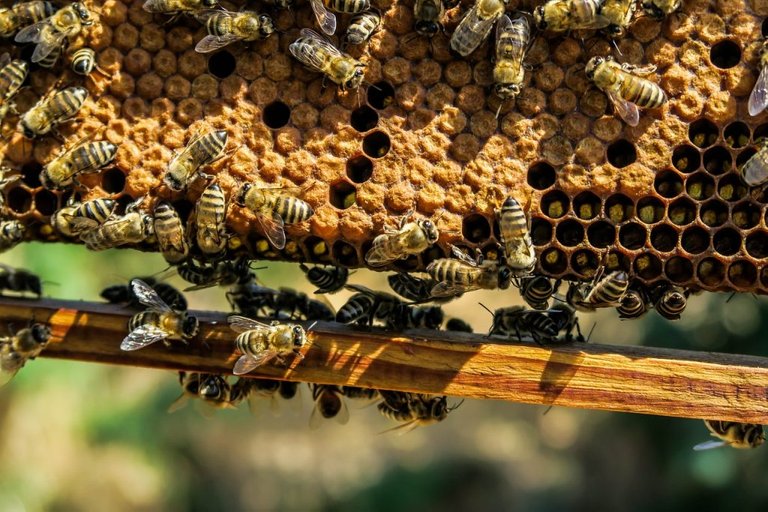
After years of back and forth speculation and conflicting studies from countries around the world, it seems fair to say neonicotinoids insecticides are causing dramatic weakening of honeybee hives. The “neonics” are a class of pesticide that has previously been linked to declines in bee populations. Neonics were developed in 1991 and commercial use began in the mid-1990s. Around 2006, commercial beekeepers began reporting what is now known as colony collapse disorder — where entire colonies of bees die off with no obvious cause. The disorder has been reported in commercial colonies all over the world. Several studies have implicated neonics, which are used to kill insects harmful to crops. Two new studies seem to confirm the danger of the class of insecticides.
The first study involved researchers in Hungary, Britain, and Germany planting fields of rapeseed, which is commonly used as a cooking oil. Some of the fields were sown with seeds treated with neonicotinoids while others were planted with untreated seeds. The teams studied the bees from spring 2015 until the following spring.
“In Hungary and Britain, the hives that had bees foraging around insecticide-treated plants had a more difficult time surviving the winter,” the Associated Press reported. ”In Germany, where the bees are generally healthier, there was no noticeable harm to the bees from the insecticide.”
The study, “Country-specific effects of neonicotinoid pesticides on honey bees and wild bees,” was published in the journal Science. “These findings point to neonicotinoids causing a reduced capacity of bee species to establish new populations in the year following exposure,” the researchers write.
“We showed significant negative effects at critical life cycle stages,” Prof Richard Pywell, of the UK’s Centre for Ecology and Hydrology (CEH), told The Guardian. “If the bees are foraging a lot on oil seed rape, they are clearly at risk. This is a large and important piece of evidence, but it is not the only evidence regulators will look at.”
Bayer and Syngenta, biotech corporations involved in the production of neonics, called the study “simplistic” and “inconsistent.”
Disturbingly, the researchers also report that the wild bees were exposed to neonicotinoids that were not used in the study. This caused the team to conclude that harm could result from “persistent residues in arable systems due to their widespread and often very frequent use.” A second study published in Science looked at Canadian corn farms and also reached this conclusion.
Researchers at York University in Canada found that wild bees are not only exposed to neonics via spraying, but also through wildflowers. “This indicates that neonicotinoids, which are water soluble, spill over from fields into the surrounding environment, where they are taken up by other plants that are very attractive to bees,” said Nadia Tsvetkov, lead researcher with York University.
York University researchers also found that neonicotinoids are twice as toxic to bees when combined with the fungicide boscalid. Prof Valérie Fournier, researcher from Laval University in Canada, told The Guardian that pesticides are not tested together. “This study shows that mixtures matter.”
Unfortunately, the dangers of neonicotinoids have been known for some time. A July 2016 study published in the journal Proceedings of the Royal Society B found that neonicotinoids do not kill drone honey bees, but instead drastically reduce the amount of live sperm produced by the male population. Researchers at Switzerland’s University of Bern found that the bees who ate pollen treated with neonicotinoids produced 39 percent less live sperm than the bees who did not eat the treated pollen.
In September 2015 a federal appeals court dealt a huge blow to the pesticide industry by issuing a ruling that blocks the use of neonics. The 9th U.S. Circuit Court of Appeals found that the U.S. EPA insufficiently tested the pesticide sulfoxaflor before approving its use in 2013. Sulfoxaflor is a type of neonicotinoid. Circuit Judge Mary Schroeder stated the EPA should have done further research once initial studies showed sulfoxaflor was highly toxic to honeybees.
The backlash against neonics caused at least one company to abandon them. In April 2016, Scotts Miracle-Gro announced that it would stop selling neonics. Although Scotts Miracle-Gro should be commended for putting on hold the production of these controversial chemicals, we should also remember that the neonics are not the only class of pesticides which have been linked to harm to the environment and animals. To truly stop the degradation that is happening to the planet and all its inhabitants, we must create and promote localized solutions for food production that do not depend on the factory farming complex and their pesticides.
Upon closer examination it would seem there is an organized effort to keep the public ignorant to the dangers of neonicotinoids. United States Department of Agriculture researcher Dr. Jonathan Lundgren filed an internal complaint in September 2014 accusing the USDA of retaliating against him in response to his neonicotinoids research. The complaint was dismissed by the USDA and Lundgren was suspended in October 2014. On October 28, 2015, Lundgren filed a complaint with the federal Merit Systems Protection Board after his supervisors allegedly began to “impede or deter his research and resultant publications.” Lundgren’s complaint alleges that his supervisors suspended him in retaliation for his research on neonicotinoid pesticides and also calls for an investigation of both the USDA and the EPA. Lundgren’s complaint is now moving forward and will hopefully provide some more insight into the possible dangers of the neonicotinoid.
I am an investigative journalist and liberty activist; a Lead Investigative Reporter for ActivistPost.com and the founder of the TheConsciousResistance.com & The Houston Free ThinkersThe Conscious Resistance: Reflections on Anarchy and Spirituality and Finding Freedom in an Age of Confusion, Vol. 1 and Finding Freedom in an Age of Confusion, Vol. 2. I have also co-authored three books with @johnvibes:
Donate via Bitcoin: 16fDdrZvt9XUv7TyboSYtaHfcxMb22Yiew
Donate via Ethereum: 0x8d20b442de44C28467b3d66939ff3077F9CfCb24
I am always available for interviews, Please contact [email protected]
I greatly appreciate any support here or on my other social media:

I upvoted and followed you please followback @mhammd
You cover a wide range of topics. This one is outside of my perview but, is motivation to look deeper into different subject matters such as this. Thank you for the motivation. We talk about deversifying our financial portfolio & ignore that principal in our intellectual wealth.
LOL, I neglected my financial folio to invest in knowledge. Now it just frustrates me because no one wants to know or are in complete denial there is a problem with the ecology of the planet. Business as usual, full steam ahead!
honey is very useful, but bees are dangerous. this is a great experience @dbroze
Bees aren't dangerous unless you frighten them. Aggressive bees though may be dangerous.
We're trying to fight disease carrying mosquitos, while promoting beneficial insects like honey bees. There's got to be a way to take care of both. @ironshield
@ironshield - stop land clearance in rainforest areas would be a big start. Mozzies aren't fans of trees, but are fans of cleared areas where water gathers.
You will never eradicate malaria and dengue through mosquito spraying. It was a program developed so DDT could be flogged to 3rd world countries to get rid of the stock left when it was banned in western countries. I used to watch the spray teams in Solomon Islands dutifully spraying everywhere, and got dengue and malaria both. I also watched them regularly wash out the drums at one of the rivers. There were no fish in that estuary and the reefs off the mouth of the river were dead and devoid of life.
Thanks for spreading the word. So much evidence! Have a nice day!
https://steemit.com/bees/@johano/no-good-times-for-bees#@wolf53/re-johano-no-good-times-for-bees-20180106t195722728z
Shock me, an insecticide that kills insects, wow. Someone did their job right. This is ridiculous. Of course pesticides and herbicides effect things other than pests. The can of fly spray with the picture of the fly does not show you that it kills bees just as effectively, and now everyone sprays for roaches and spiders with residual sprays. The chemical industry has sold the lie insects are bad to sell their death in a can.
Now think, what is that doing to you? I refuse to allow pesticides, including fly spray, onto my property.
"I refuse to allow pesticides, including fly spray, onto my property."
Amen!